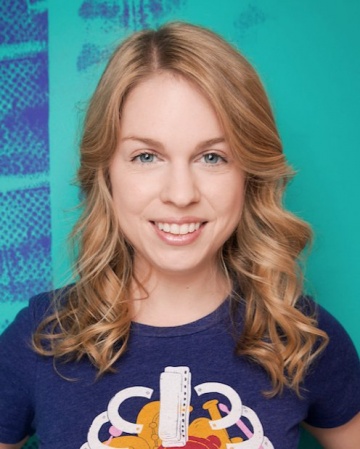Columbia College | Columbia University in the City of New York
TV Writer Learned the Power of Collaboration Over Competition

Combining her passion for comedy with social justice, Stewart participated in the 2019 Comedy Think Tank at the Climate Story Lab, the 2020 Comedy Think Tank on Paid Family Leave and the 2021 Stand Up for Climate Comedy Show. Alongside co-creator Keisha Zollar, she is a winner of the 2020 Yes, And… Laughter Lab for their comedic docuseries about women’s health based on their shared experiences with the healthcare system.
Stewart is currently in pre-production on a feature documentary and has television projects in development with Dreamville Studios, Swimsuit Competition, and Soledad O’Brien Productions.
What were you like when you arrived at Columbia?
For most of my time growing up in Dallas I was desperate to escape, but second semester senior year of high school I fell in love and decided, “Texas isn’t so bad!” So, I arrived at Columbia simultaneously eager to meet this new challenge and heartbroken, wondering what I had gotten myself into.
Two of my best friends from Texas also went to Columbia, Anisha Steephen ’09 and Melissa Saldana ’09. This was a huge relief, even though we agreed to make new friends because we were “mature adults.” At least, they were. I don’t know about me.
After a few weeks on campus, though, I auditioned for a lot of theater productions I didn’t get into, a few I did, and joined an improv group and a sketch comedy group. These theater and comedy nerds are some of my best friends to this day. They taught me the power of collaboration over competition, that talent is practice over time, and that humor in service of empathy is more difficult and valuable than mean-spirited, self-serving comedy.
What do you remember about your first-year living situation?
My Carman 4 floor was very sporty. Everyone was at least a foot taller and broader than I. I have no idea why I was placed there. They were 90 percent muscle and I was 90 percent Oreos. What I did like was having a semi-private bathroom and a lounge TV that carried Comedy Central so I could watch The Colbert Report every night. That seems pretty depressing until you find out my first full-time job was at The Colbert Report four years later. Then I sound like a genius and not a lonely freshman.
What Core class or experience do you most remember, and why?
In my University Writing class, we read a lens piece about a woman with breast cancer who hated the term “survivor.” Her words resonated with me, especially during senior year, when I was diagnosed with kidney disease and had to have a kidney transplant. I didn’t feel like a survivor, either, just a person who won a terrible lottery and spent her final semester in recovery (I have a lot of empathy for the students whose college experiences got disrupted by the pandemic).
While I enjoyed the Core — my Lit Hum professor Michael Seidel especially stands out — I wanted more history. I was fortunate enough to take an American history course with the legendary professor Alan Brinkley (I remember hopefully discussing a possible Obama presidency during one of our classes); but in order to do so, I had to drop Professor Eric Foner’63, GSAS’69’s “The Radical Tradition in America.” I thought I could take Foner’s class senior year, but then the whole kidney thing happened. Fortunately, 10 years later, I wrote a docuseries where we interviewed Professor Foner for eight hours. I couldn’t believe I was getting paid to take my own personal seminar on Reconstruction! Which might be something only Columbia alumni would appreciate.
Did you have a favorite spot on campus, and what did you like about it?
Surprisingly, one of my favorite spaces was Wien Hall, where I never lived but often performed with my sketch and improv groups. As a performance space, I preferred the Black Box Theatre in Lerner, but my teams were perpetually too broke to afford it. Scrambling to make a student lounge into a suitable theater (or at least theater-adjacent) a few hours before the show made the laughs we got that night all the sweeter. It also prepared me for being a producer and seeing budget limitations as a chance for creativity.
What, if anything, about your College experience would you do over?
Honestly, I’d love to not have to go through the whole kidney thing. Hard pass. Beyond that, like everyone else, I wish I could have taken more classes. I also wouldn’t sell all my Core books — with margins full of scribbled notes — just because I couldn’t find storage for them over the summer (the perpetual problem of anyone whose hometown wasn’t within driving distance).
But mostly I’d be more engaged in the kinds of issues that I’ve dedicated my career and activism to: racial justice, human rights, environmental justice, healthcare equity, and all of the interconnected concerns. I was so focused on becoming a better writer and comedian that I missed an opportunity to be part of Columbia’s legacy of protest and to meet people I could have worked with and learned from.
More “Take Five”
- 1 of 32
- ›

